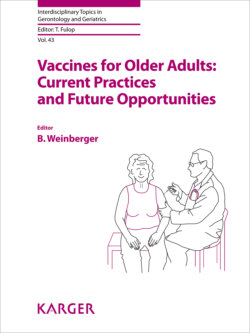Читать книгу Vaccines for Older Adults: Current Practices and Future Opportunities - Группа авторов - Страница 15
На сайте Литреса книга снята с продажи.
Macrophages
ОглавлениеMacrophages are versatile innate immune cells that are important for initiating proinflammatory immune responses in addition to roles in phagocytosis, resolution, and tissue repair after injury. In the steady-state, anti-inflammatory macrophages help maintain homeostatic conditions within the tissue and become activated in response to infection or injury. Activated macrophages can secrete a variety of cytokines (e.g., TNFα, IL-1β, NO) that prime the inflammatory immune response and chemokines (MIP-2, KC) that recruit additional immune cells. After pathogen clearance, anti-inflammatory macrophages help clear apoptotic and necrotic debris and secrete cytokines and growth factors that promote tissue repair and regeneration. Mouse studies have shown the large variety of functions carried out by macrophages reflects the existence of multiple subsets and lineages of macrophages, each occupying distinct niches within tissues. For example, resident macrophages have recently been reported to interact directly with the nervous system in the intestine [28] and adipose tissue [29, 30] to regulate tissue function. Taken together, these data indicate macrophages have a central role in maintaining tissue homeostasis and also orchestrating immune responses.
Despite this importance, relatively little is known about changes in tissue macrophage function during aging, largely due to their poor accessibility within tissues. Monocyte-derived macrophages from human elderly human blood donors show impaired DC-SIGN-induced reduction in the expression of TLR3 following infection with West Nile virus (WNV) in vitro [31]. This impairment via the signal transducer and activator of transcription 1 (STAT1)-mediated pathway may be relevant for elevated cytokine production contributing to permeability of the blood-brain barrier and increased severity of WNV infection in older individuals [31, 32]. Murine studies also support an age-related increase in influenza A virus (IAV) susceptibility that may contribute to impaired tissue repair and altered cytokine dynamics [33–35]. In aged mice, elicited peritoneal macrophages showed reduced phagocytosis of FITC-labeled Escherichia coli [36]. Importantly, this same study found in vitro differentiated bone marrow-derived macrophages from old mice did not have this defect, suggesting mechanisms beyond cell-intrinsic changes during aging. Notably, peritoneal macrophages transferred from adult into old mice lost their phagocytic capacity. This result emphasizes that the tissue environment is a critical determinant of macrophage function.
